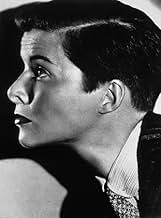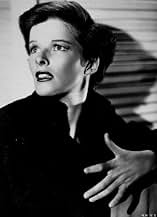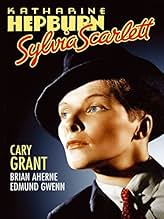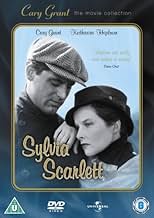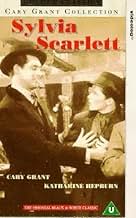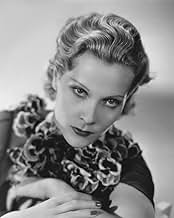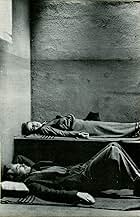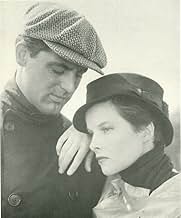Sylvia Scarlett
- 1935
- Tous publics
- 1h 35m
IMDb RATING
6.2/10
4.8K
YOUR RATING
When her father decides to flee to England, young Sylvia Scarlett must become Sylvester Scarlett and protect her father every step of the way, with the questionable help of plenty others.When her father decides to flee to England, young Sylvia Scarlett must become Sylvester Scarlett and protect her father every step of the way, with the questionable help of plenty others.When her father decides to flee to England, young Sylvia Scarlett must become Sylvester Scarlett and protect her father every step of the way, with the questionable help of plenty others.
- Awards
- 1 win total
Robert Adair
- Turnkey
- (uncredited)
Bunny Beatty
- Maid
- (uncredited)
May Beatty
- Older Woman on Ship
- (uncredited)
Daisy Belmore
- Fat Woman on Beach
- (uncredited)
Carmen Beretta
- Woman
- (uncredited)
Nina Borget
- Minor Role
- (uncredited)
Thomas Braidon
- Minor Role
- (uncredited)
Elsa Buchanan
- Minor Role
- (uncredited)
Colin Campbell
- Minor Role
- (uncredited)
James Carlisle
- Park Scam Onlooker
- (uncredited)
Patricia Caron
- Minor Role
- (uncredited)
Harold Cheevers
- Bobby
- (uncredited)
E.E. Clive
- Customs Inspector
- (uncredited)
Edward Cooper
- Customs Inspector
- (uncredited)
Featured reviews
This is an odd film - definitely an odd one. Even in a period when the Hayes Office, the Breen Office, the movie code, and the Catholic Legion of Decency were still finding their feet, this film just stretched gender roles as far as possible. And the audiences of 1935, who tolerated MUTINY ON THE BOUNTY, THE INFORMER, and many other films, would not tolerate this one.
The issue is whether or not the audiences of 2006 would tolerate it. I gather that we are better used to bi-sexual, homosexual, or transsexual genres in movies in the last half century, but having said that I keep realizing that many people aren't. I also note that of the four Grant - Hepburn films this one is the least revived (which is odd, because it was the first one made). I have a feeling that the fans of this film fall into three categories: those who enjoy the sexual suggestiveness of it's storyline, those who enjoy the two stars and their acting abilities, and those who like the director, George Cukor. Outside those three groups, there are many people who are probably (at best) indifferent to this movie, and (at worst) positively hostile to it.
I could understand part of the hostility. It is the crazy screenplay in the film. This movie never comes to grips with exactly what it wants to do. It starts off with a kind of "Dr. Crippen" situation (though actually not as serious), wherein Edmund Gwenn has committed embezzlement and must flee France with his daughter Hepburn - whom he disguises as a son to help his own escape disguise (this resembles Crippen's disguising his girlfriend Ethel Le Neve as a son when fleeing to Canada on the "Montrose"). Hepburn just barely passes as a boy (her bony face just makes it). Then they meet grifter Cary Grant, and join him in a series of con games.
First problem in script here - if Gwenn and Hepburn are fleeing the French authorities to get to England, doesn't it undercut their efforts to continue a criminal path with Grant? If they are caught (as they nearly are) the British police will return Gwenn to France, rather than probably ignore him if he just behaves himself in England. Of course, for them to get into a story involving Grant the script requires them to behave in line with him.
This was the first film that Katherine Hepburn and Cary Grant appeared in together, and in the wake of the later Tracy series it has somehow gotten pushed slightly (not totally) into the shadows. It is similar to the series of musicals by Jeanette MacDonald and Maurice Chevalier for Paramount in the early 1930s, that are slightly (not quite totally) in the shadows of the later musical series with Nelson Eddy. The later films (particularly BRINGING UP BABY and THE PHILADELPHIA STORY) are far more popular - despite the screwiness of the former those films (and HOLIDAY) have coherent plots. We aren't trying to figure out if the film is funny or sad, or if it's about con artists or small time performers. We don't have to worry in the later three films about allegory (the scene in SCARLET when they are performing in Comedia del Arte costumes, with Gwenn - growing jealous about his girlfriend's activities - dressed as "Pierrot" is definitely allegorical). One can say SYLVIA SCARLET is a film with something for everyone - question is does that make it a good film?
Because I like George Cukor (who later would work with both Grant and Hepburn to better effect), and see that Hepburn and Grant and Brian Ahearn and Gwenn are giving their all to their parts, I am willing to say I'm favorably impressed enough to give this an "8" out of "10". But I will maintain that this odd little movie is not one meant for large audiences or for huge popular approval.
The issue is whether or not the audiences of 2006 would tolerate it. I gather that we are better used to bi-sexual, homosexual, or transsexual genres in movies in the last half century, but having said that I keep realizing that many people aren't. I also note that of the four Grant - Hepburn films this one is the least revived (which is odd, because it was the first one made). I have a feeling that the fans of this film fall into three categories: those who enjoy the sexual suggestiveness of it's storyline, those who enjoy the two stars and their acting abilities, and those who like the director, George Cukor. Outside those three groups, there are many people who are probably (at best) indifferent to this movie, and (at worst) positively hostile to it.
I could understand part of the hostility. It is the crazy screenplay in the film. This movie never comes to grips with exactly what it wants to do. It starts off with a kind of "Dr. Crippen" situation (though actually not as serious), wherein Edmund Gwenn has committed embezzlement and must flee France with his daughter Hepburn - whom he disguises as a son to help his own escape disguise (this resembles Crippen's disguising his girlfriend Ethel Le Neve as a son when fleeing to Canada on the "Montrose"). Hepburn just barely passes as a boy (her bony face just makes it). Then they meet grifter Cary Grant, and join him in a series of con games.
First problem in script here - if Gwenn and Hepburn are fleeing the French authorities to get to England, doesn't it undercut their efforts to continue a criminal path with Grant? If they are caught (as they nearly are) the British police will return Gwenn to France, rather than probably ignore him if he just behaves himself in England. Of course, for them to get into a story involving Grant the script requires them to behave in line with him.
This was the first film that Katherine Hepburn and Cary Grant appeared in together, and in the wake of the later Tracy series it has somehow gotten pushed slightly (not totally) into the shadows. It is similar to the series of musicals by Jeanette MacDonald and Maurice Chevalier for Paramount in the early 1930s, that are slightly (not quite totally) in the shadows of the later musical series with Nelson Eddy. The later films (particularly BRINGING UP BABY and THE PHILADELPHIA STORY) are far more popular - despite the screwiness of the former those films (and HOLIDAY) have coherent plots. We aren't trying to figure out if the film is funny or sad, or if it's about con artists or small time performers. We don't have to worry in the later three films about allegory (the scene in SCARLET when they are performing in Comedia del Arte costumes, with Gwenn - growing jealous about his girlfriend's activities - dressed as "Pierrot" is definitely allegorical). One can say SYLVIA SCARLET is a film with something for everyone - question is does that make it a good film?
Because I like George Cukor (who later would work with both Grant and Hepburn to better effect), and see that Hepburn and Grant and Brian Ahearn and Gwenn are giving their all to their parts, I am willing to say I'm favorably impressed enough to give this an "8" out of "10". But I will maintain that this odd little movie is not one meant for large audiences or for huge popular approval.
"Odd" doesn't begin to describe what transpires in this movie. It's all like someone's dream, with unconnected events moving in and out of each other - tied together with the loosest of threads - with no real meaning. The only real reason to watch this movie is to see Hepburn and Grant before they were really big.
Unfortunately, there is absolutely no chemistry at all between any of the characters. Grant is handed a terribly drawn character and gets no real room to develop a relationship with the audience - or anyone else. Hepburn is just screechingly annoying. The rest of the cast isn't too much better, but I don't blame them. It's a terrible, terrible screenplay and is not an enjoyable time to sit through.
That's another thing. I wouldn't really have minded all the bad elements of the movie if I had a good time watching it. If not a few good laughs, at least Grant/Hepburn is usually worth some interest because of their ability to bring out the best in each other. No such luck here.
Unfortunately, there is absolutely no chemistry at all between any of the characters. Grant is handed a terribly drawn character and gets no real room to develop a relationship with the audience - or anyone else. Hepburn is just screechingly annoying. The rest of the cast isn't too much better, but I don't blame them. It's a terrible, terrible screenplay and is not an enjoyable time to sit through.
That's another thing. I wouldn't really have minded all the bad elements of the movie if I had a good time watching it. If not a few good laughs, at least Grant/Hepburn is usually worth some interest because of their ability to bring out the best in each other. No such luck here.
An extremely unusual little film from director George Cukor makes the odd transition from caper comedy to coming of age romance - and occasionally teeters back and forth between the two. The film was a massive flop at the box office (in order to make amends for the film's failure, Cukor and star Katharine Hepburn reportedly offered to make their next film for free), and the audiences of thirties just didn't seem to understand film's bizarre juxtaposition between gritty depression-era realism and dreamy Hollywood surrealism. In all truth, however, the film is enormously entertaining when viewed today, and its unusual tone will be better appreciated by modern audiences.
Although this is the performance that led her to be labeled by critics and theater owners as "box office poison," Hepburn is delightful in role that was quite offbeat for the time (this was 48 years before Barbra Streisand donned male drag in YENTL). Brian Aherne also delivers an endearingly off-kilter performance as Sylvia's love interest, and Edmund Gwenn is terrific in the difficult role of Sylvia's father, who must balance humor and pathos at regular intervals. Best of all is Cary Grant who flat-out nails his role as a cockney con man, and simply radiates with wit, sex appeal, and macho charisma. He alone would make the film worth watching, but, on the whole, SYLVIA SCARLETT remains a lost gem that was very much ahead of its time.
Although this is the performance that led her to be labeled by critics and theater owners as "box office poison," Hepburn is delightful in role that was quite offbeat for the time (this was 48 years before Barbra Streisand donned male drag in YENTL). Brian Aherne also delivers an endearingly off-kilter performance as Sylvia's love interest, and Edmund Gwenn is terrific in the difficult role of Sylvia's father, who must balance humor and pathos at regular intervals. Best of all is Cary Grant who flat-out nails his role as a cockney con man, and simply radiates with wit, sex appeal, and macho charisma. He alone would make the film worth watching, but, on the whole, SYLVIA SCARLETT remains a lost gem that was very much ahead of its time.
"Sylvia Scarlett" is like a screwball comedy that can't commit to being a screwball comedy.
Hepburn spends much of the first part of the film disguised as a boy so that she and her father (Edmund Gwenn), who are on the lam because of Gwenn's gambling debts, will be less conspicuous. They meet up with a Cockney shyster played by Cary Grant, who falls for Hepburn once he realizes she's actually a girl. Brian Aherne, playing a handsome gentleman the three come across during their travels, falls for her too. The finale involves a zany chase in which Hepburn and Aherne take off after Grant and Aherne's girlfriend in an attempt to get them back, only to discover once they've set off that they really like each other and don't much care about finding the disloyal lovers.
The fact that the film takes on gender issues at ALL makes it a curio worthy of interest, but just WHAT the film wants to do with those gender issues is never clear. Hepburn plays the character like a tomboy who's uncomfortable in her feminine skin, which is completely at odds with the girly girl she portrays in the film's very first scene. The film is never especially funny, but its overall tone is too lighthearted for the dramatic moments to make much of an impact. The editing is ragged and jumpy, which makes me wonder if the studio did some injudicious hacking, leaving elements that that would have made the film make more sense on the cutting room floor.
Critics and audiences have largely dismissed this film with an indifferent shrug, and I can't say that I blame them.
Grade: C
Hepburn spends much of the first part of the film disguised as a boy so that she and her father (Edmund Gwenn), who are on the lam because of Gwenn's gambling debts, will be less conspicuous. They meet up with a Cockney shyster played by Cary Grant, who falls for Hepburn once he realizes she's actually a girl. Brian Aherne, playing a handsome gentleman the three come across during their travels, falls for her too. The finale involves a zany chase in which Hepburn and Aherne take off after Grant and Aherne's girlfriend in an attempt to get them back, only to discover once they've set off that they really like each other and don't much care about finding the disloyal lovers.
The fact that the film takes on gender issues at ALL makes it a curio worthy of interest, but just WHAT the film wants to do with those gender issues is never clear. Hepburn plays the character like a tomboy who's uncomfortable in her feminine skin, which is completely at odds with the girly girl she portrays in the film's very first scene. The film is never especially funny, but its overall tone is too lighthearted for the dramatic moments to make much of an impact. The editing is ragged and jumpy, which makes me wonder if the studio did some injudicious hacking, leaving elements that that would have made the film make more sense on the cutting room floor.
Critics and audiences have largely dismissed this film with an indifferent shrug, and I can't say that I blame them.
Grade: C
Androgeny is a quality that some of the biggest of our great stars possessed: Garbo, Dietrich, Grant, Vanessa Redgrave, to name a few, and of course, Katharine Hepburn. In "Sylvia Scarlett," she plays a young woman masquerading as a young man for part of this rather strange film that can't make up its mind what it is. The movie also stars Cary Grant, Edmund Gwenn and Brian Aherne. Gwenn is Henry Scarlett, an embezzler who has to high-tail it out of England fast. When his daughter Sylvia insists on going along, he tells her everyone will be looking for him with his daughter, so Sylvia becomes Sylvester by cutting his hair and donning mens' clothes.
On the boat, the two meet Jimmy Monckley, a con man, and eventually team up with him for a series of cons. Then a flirtatious maid friend of Jimmy's joins them and they become vaudevillians in one of the film's more bizarre twists. Henry, a widower, marries said maid and winds up obsessive and jealous (with, one suspects, good reason since she makes a pass at Sylvia as Sylvester). One night at a performance, the cast meets an artist, Michael Fane, whom Sylvia falls for, and she ultimately reveals himself to him as a woman.
The plot of this film changes more than the sexes, with Hepburn inexplicably staying a boy once she and her father have made their escape to France. There are some great scenes - the con in the French park, with Sylvia pretending to be a destitute boy who can't speak English, and the scene where the dress she stole on the beach so she could make her big reveal to Michael is recognized by the owner. Also, the act they perform is amusing. It probably would have been better to stick with the con angle and have the script go from there, but it goes from that to the performance angle to a love triangle etc.
Katharine Hepburn makes both an excellent boy and young woman in the throes of first love, and Cary Grant has an early, uncharacteristic role as an absolute thief and heel who is also somewhat abusive. His persona would change, and he would find it difficult to convince anyone later on to let him go back to this type of character who is not redeemed at the end. But his good looks and charm make him a natural rogue. The underrated Brian Aherne, who it appears wound up taking a back seat to Errol Flynn, is marvelous as Michael. He's romantic, sexy, and gives the role a light touch.
Directed by George Cukor, "Sulvia Scarlett" is a dizzy film that's not a wild comedy (which it probably should have been) or a drama or a love story. It's remembered today for Hepburn's cross-dressing. A shame, because it could have been remembered for more than that.
On the boat, the two meet Jimmy Monckley, a con man, and eventually team up with him for a series of cons. Then a flirtatious maid friend of Jimmy's joins them and they become vaudevillians in one of the film's more bizarre twists. Henry, a widower, marries said maid and winds up obsessive and jealous (with, one suspects, good reason since she makes a pass at Sylvia as Sylvester). One night at a performance, the cast meets an artist, Michael Fane, whom Sylvia falls for, and she ultimately reveals himself to him as a woman.
The plot of this film changes more than the sexes, with Hepburn inexplicably staying a boy once she and her father have made their escape to France. There are some great scenes - the con in the French park, with Sylvia pretending to be a destitute boy who can't speak English, and the scene where the dress she stole on the beach so she could make her big reveal to Michael is recognized by the owner. Also, the act they perform is amusing. It probably would have been better to stick with the con angle and have the script go from there, but it goes from that to the performance angle to a love triangle etc.
Katharine Hepburn makes both an excellent boy and young woman in the throes of first love, and Cary Grant has an early, uncharacteristic role as an absolute thief and heel who is also somewhat abusive. His persona would change, and he would find it difficult to convince anyone later on to let him go back to this type of character who is not redeemed at the end. But his good looks and charm make him a natural rogue. The underrated Brian Aherne, who it appears wound up taking a back seat to Errol Flynn, is marvelous as Michael. He's romantic, sexy, and gives the role a light touch.
Directed by George Cukor, "Sulvia Scarlett" is a dizzy film that's not a wild comedy (which it probably should have been) or a drama or a love story. It's remembered today for Hepburn's cross-dressing. A shame, because it could have been remembered for more than that.
Did you know
- TriviaHoward Hughes visited the set one day, landing his amphibious plane near the beach where they were filming. Hughes said he stopped by to say hello to his good friend Cary Grant but in actuality he wanted to meet Katharine Hepburn, with whom he was fascinated. The film Aviator (2004) recreates this first meeting of theirs.
- GoofsWhen Sylvester yells for a cop outside the mansion, Henry gets left outside. Jimmy opens the door and pulls Henry in roughly. In doing so, Henry loses a shoe. Inside the mansion, Henry has both shoes, never having retrieved his shoe from outside.
- Quotes
Sylvia Scarlett: Well, we're all fools sometimes. Only you choose such awkward times.
- ConnectionsFeatured in The Men Who Made the Movies: George Cukor (1973)
- SoundtracksHello ! Hello ! Who's your Lady Friend ?
(uncredited)
Music by Harry Fragson
Lyrics by Worton David and Bert Lee (1914)
Sung by Cary Grant and Edmund Gwenn
- How long is Sylvia Scarlett?Powered by Alexa
Details
Box office
- Budget
- $641,000 (estimated)
- Runtime
- 1h 35m(95 min)
- Color
- Aspect ratio
- 1.37 : 1
Contribute to this page
Suggest an edit or add missing content

